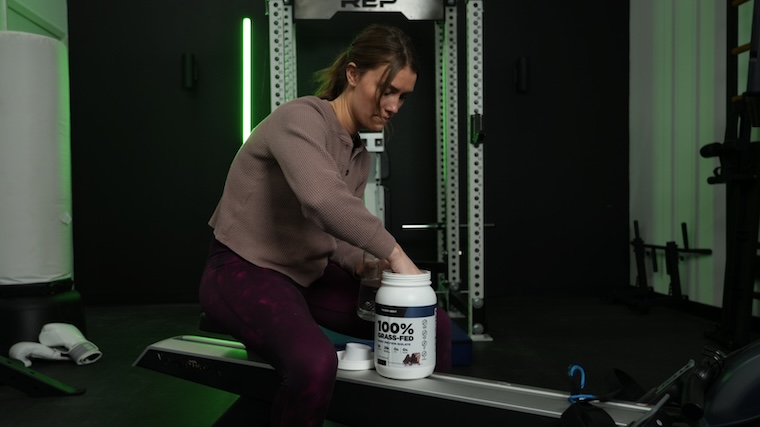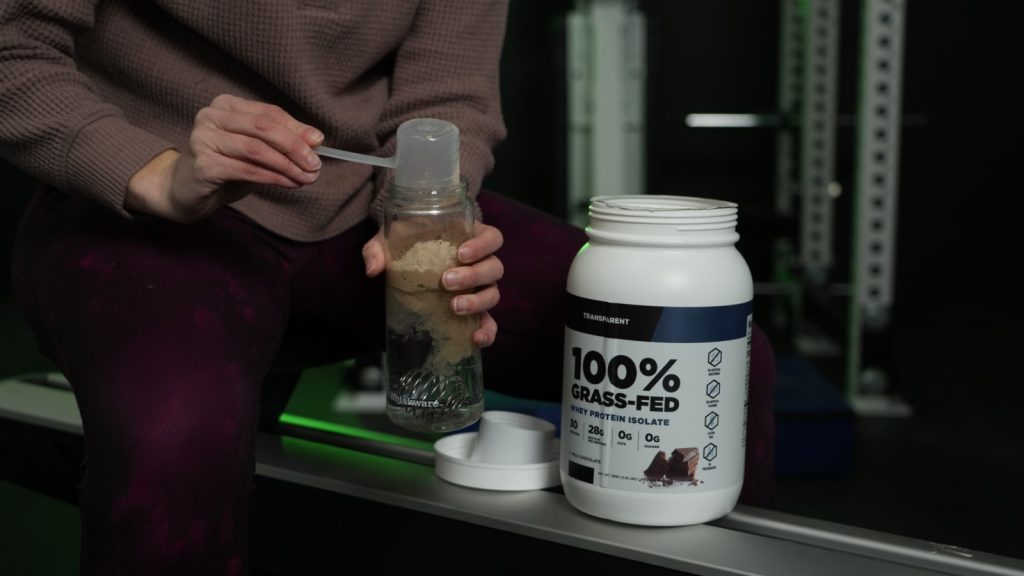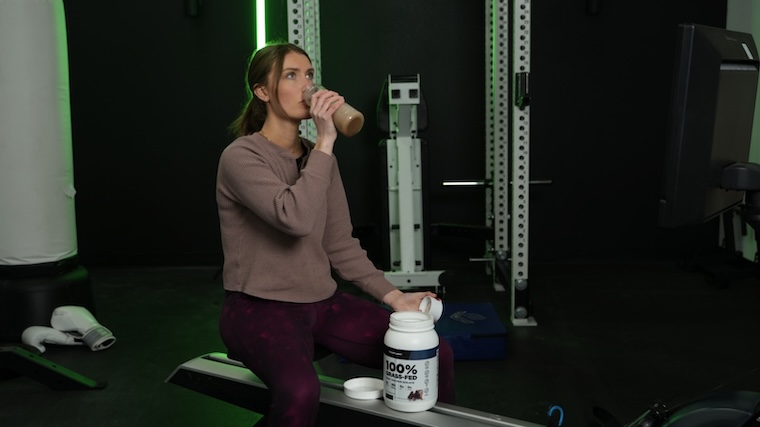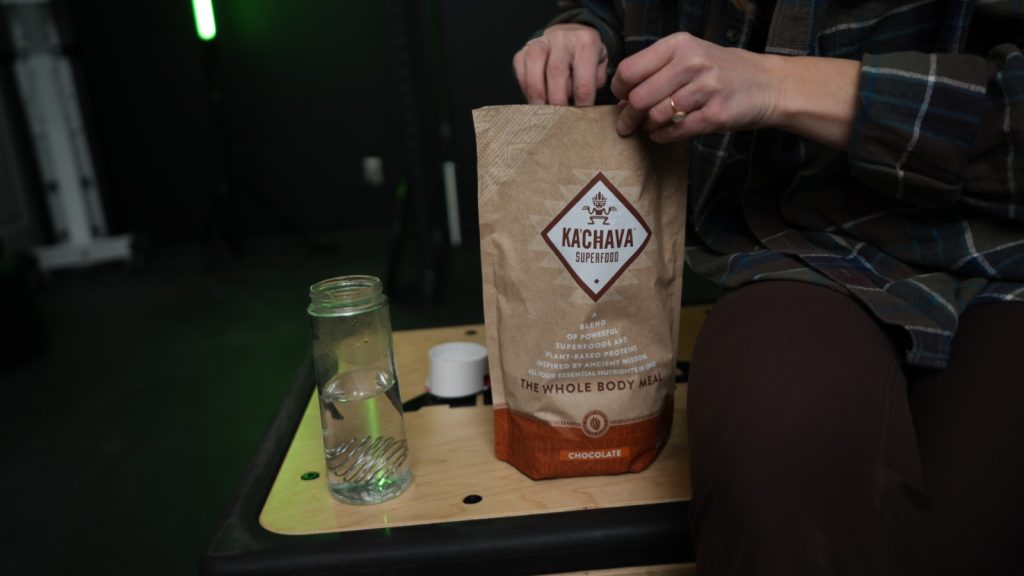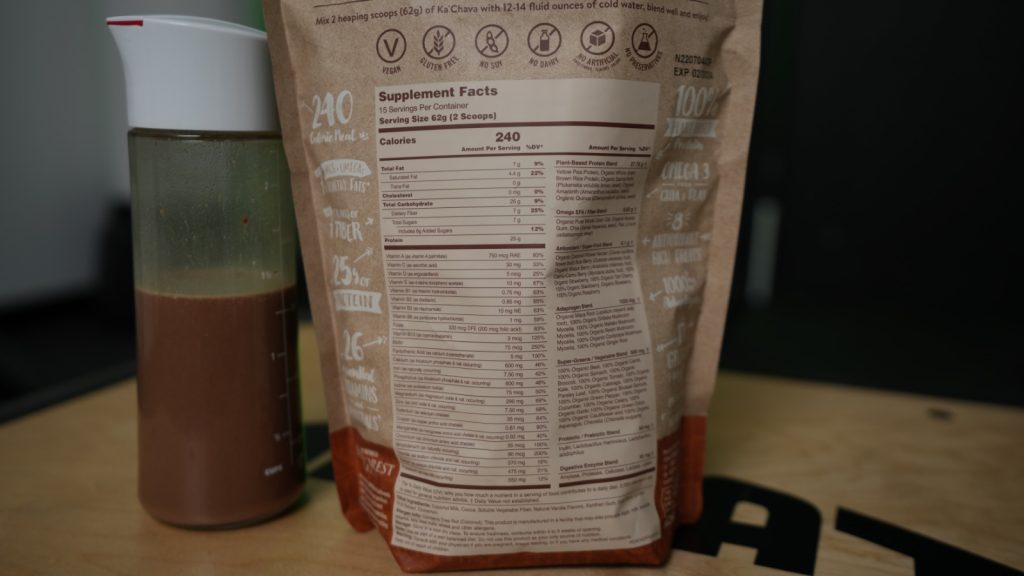Whether you are looking for gains in muscular size or just want to stay full between meals, a protein shake can be a useful tool in your dietary arsenal. The majority of protein shakes are derived from whey protein, which is so effective because of its broad amino acid profile. (1)(2)(3) But there are non-whey protein shakes on the market, too.
With so many different products on the market, finding which to buy (and which to absolutely avoid) is no easy task. To make your life easier, our team of Barbend experts tested 17 different products to narrow down the absolute best protein shakes for your fitness goals and dietary needs.
Best Protein Shakes
- Best Protein Shake: Ka’Chava Whole Body Meal
- Best Protein Shake for Weight Loss: Onnit Grass Fed Whey Protein Shake
- Best Protein Shake for Muscle Building: Transparent Labs Whey Protein Isolate
- Best Tasting Protein Shake: Onnit Grass Fed Whey Protein Shake
- Best Meal Replacement Protein Shake: Ka’Chava Whole Body Meal
- Best Plant-Based Vegan Protein Shake: Kaged Plantein Protein Shake
- Best Protein Shake for Keto: Ample Low-Carb Meal Shake
- Best Protein Shake On the Go: Ample Recover Meal Replacement Shake
Editor’s note: The content on BarBend is meant to be informative in nature, but it should not be taken as medical advice. The opinions and articles on this site are not intended for the diagnosis, prevention, and/or treatment of health problems. It’s always a good idea to talk to your doctor before beginning a new fitness, nutritional, and/or supplement routine.
How We Tested and Chose the Best Protein Shakes
Protein shakes are a dime a dozen nowadays, so narrowing this list down to our favorites was quite the task. Here are a few of the guiding principles taken from our supplement testing methodology that we followed to tabulate our top picks.
Formulation
A protein shake should deliver on its total protein dosage per serving. Most supplements average around 20 grams per serving — however, we prioritized products that exceeded that number. But beyond the protein per serving, the supplement of your choice should help you reach your overall daily protein intake goals. You can figure out what that means for you by using this protein intake calculator.
While the protein content is key, the rest of the supplement’s macro profile matters, too. For those seeking a large supply of protein with little carbs and fats, a more protein-concentrated whey isolate makes the most sense. But for athletes who need a more complete recovery drink, additional carbs is ideal. We tried and chose products that tick all these boxes, so we can suit differing athletes’ needs.
Calories
You’ll find that protein shakes with more varying macros are usually higher in calories, which makes sense, as one gram of protein or carbs has four calories, while one gram of fat has nine calories. Many people take protein shakes to potentially aid in muscle growth so we included options for that goal though technically any of the choices on the list will fit the bill.
For customers looking for a protein shake that only provides the necessary protein dose, you might want to stay away from other products that are higher in carbs and fats. As far as meal replacement is concerned, calories are the name of the game. We’ve included a variety of protein shakes for people with different caloric needs, so you can find the product that’s best for you no matter what your fitness goals are.
Value
While it would be nice if everyone could afford the top-shelf product, we don’t all have a limitless budget. But that doesn’t mean that you need to sacrifice quality to keep the budget low. Most of the whey protein powders on our list range from about 80 cents per ounce up to two dollars per ounce. So regardless of your financial limitations, you can be sure to find a great choice at a great value.
Flavor
The best type of protein shake is one that you’ll drink consistently because you actually like the flavor. We know flavor is subjective, though, so we gave a number of flavors a try, offering a good amount of variety. We paid close attention to aftertaste and artificial flavors because we know that matters.
Best Protein Shake: Ka’Chava Whole Body Meal
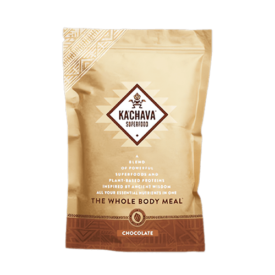
This vegan meal replacement offers various superfood blends that include organic fruits, vegetables, mushrooms, enzymes and probiotics. It totals 240 calories, 25 grams of plant-based protein, 25 grams of carbohydrates (including seven grams of fiber), and seven grams of fat.
Specs
- Protein: 25g
- Available Flavors: Vanilla, Chocolate, Coconut Acai, Chai, Matcha
- Price: $69.95
Pros
- This protein shake has 25 grams of protein per scoop, which is more than the 20 grams most others pack.
- This formula has digestive enzymes papain and lactase.
- This one contains seven grams of fat, 24g of carbs, and micronutrients, which others don’t.
Cons
- This shake is made with plant-based protein, whereas some athletes may prefer whey.
- This one is 240 calories per serving, which is more than most.
Anyone looking for a big dose of protein knows that a protein shake can offer the infusion you’re looking for. Slamming back a protein shake after a hard workout can help you make some serious gains. Our top pick for best protein shake, Ka’Chava’s Whole Body Meal, delivers 25g of plant-based protein to help you hit your daily protein goals, and/or fuel your recovery.
Unlike most protein powders that only contain one type of protein, this product is made from a combination of pea protein, rice protein, amaranth, and quinoa. This makes for a higher protein content per scoop without any extra fillers or additives. Each scoop provides a solid 25g of protein and 240 calories with 7g of fat.

Technically a meal replacement, Ka’Chava’s formula also provides ample micronutrients, including 750mcg vitamin A, 30mg vitamin C, 5mcg vitamin D, 1mg vitamin B, 3mcg vitamin B12, and iron, among others. So, you’ll get the nutritional benefits of a well-rounded post-workout meal. Ka’Chava also includes the digestive enzymes amylase, protease, cellulase, lactase, and lipase, which can help you better break down and absorb the protein, and work against bloating.
You can choose from five delicious flavors, including vanilla, chocolate, coconut acai, chai, and matcha. We personally tried the Chai flavor, which our testers enjoyed, however, we did think the flavor was a little too unique for everyday use. So, unless you’re a huge chai fan, you may want to opt for a more classic taste, like vanilla or chocolate.
While there are many great picks on this list, Ka’Chava’s Whole Body Meal takes the top spot because of its high dose of protein, additional nutrients, and versatile protein blend. Plus, it’s got great flavor options.
Best Protein Shake for Weight Loss: Onnit Grass Fed Whey Protein Shake
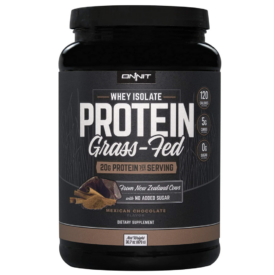
A grass-fed whey isolate includes added ingredients for digestion like seven digestive enzymes and a probiotic (lactobacillus acidophilus). It's also gluten-free, sugar-free, and soy-free.
Specs
- Protein: 20g
- Available Flavors: Vanilla, Mexican Chocolate
- Price: $47.96
Pros
- This protein is relatively low in calories, with only 110 calories per serving, making it ideal for weight loss.
- Made primarily from whey, this supplement has only three grams of carbs and two grams of fat.
- Onnit includes digestive enzymes in this blend.
Cons
- This formula probably doesn’t have enough macros for a full recovery drink.
- You only get two flavor options here.
For people who are pursuing weight loss, protein shakes may be a great way to help curb hunger and get quality calories instead of eating junk. A whey protein isolate shake can assist along your weight loss journey, and the whey isolate in Onnit Grass Fed Whey Protein Shake makes it our top pick for best protein for weight loss.

Onnit’s protein is made from whey protein isolate, which may digest and absorb better and cause less bloating (as whey isolate powder is broken down further than whey concentrate). Each scoop provides you with 20g of high-quality whey isolate, and either 110 calories or 120 calories depending on flavor.
Onnit also incorporates digestive enzymes for an added digestive benefit. They include a blend of amylase, protease, lipase, and other enzymes that can help aid in the breakdown of polypeptide chains in lactose and amine chains in proteins. (4)
While this product only comes in two flavors, we did think the chocolate was pretty unique. Our tester thought it was richer than other chocolate flavors they’ve tried, especially when mixed with whole or oat milk.
Read our full Onnit Grass Fed Whey Protein Shake Review.
Best Protein Shake for Muscle Gain: Transparent Labs Whey Protein Isolate
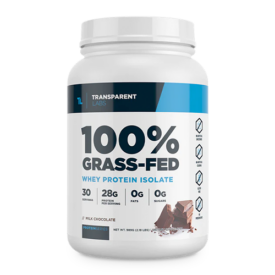
With 8 different flavors and 28 grams of whey protein from hormone-free, grass-fed cows, Transparent Labs Whey Protein Isolate is an excellent way to hit your protein macros.
Specs
- Protein: 28g
- Available Flavors: Milk Chocolate, Vanilla Oatmeal Cookie, French Vanilla, Peanut Butter, Dark Chocolate, Chocolate Peanut Butter, Oatmeal Chocolate Chip Cookie, Unflavored, Strawberry Milkshake, Vanilla Peanut Butter, Mocha, Cinnamon French Toast, Blueberry Pancakes
- Price: $59.99
Pros
- For those looking to gain muscle, this protein packs 28g, which is more than most protein supplements we list.
- This supplement has little other calories, as it’s only 0g of fat and one gram of carbs.
- You get 13 different flavor options.
Cons
- Other formulas include digestive enzymes, which Transparent Labs does not.
- After a workout, some athletes may want a shake with more macros for recovery.
There are many reasons why people would consume a protein shake, just like there are many reasons why people go to the gym. Some people want to lose weight, some want better health, and some want to pack on as much Grade A USDA Beef on their frame as they can. If you’re looking to gain muscle mass, then this shake is for you.
All aboard the gains train with this product from Transparent Labs. This protein shake packs 28g of protein per serving from whey isolate. TL is also sweetened with stevia, which is ideal for those who want to avoid the unwanted gas and bloating that some artificial sweeteners can cause. After all, you want your muscles to look full, not your belly, right?
Each scoop is only 120 calories with zero grams of fat and one gram of carbs, and a full 28g of protein, meaning you’re not drinking a ton of calories that you could be eating instead. The flavors are varied and allow you to keep it fresh with 13 delicious shakes. Another bonus: This powder dissolves pretty easily with little floating residue, according to our personal testers.
“This is my third month being a subscriber and so far, I am seeing and feeling the results,” writes one five-star customer review (among many). “The protein tastes great and doesn’t make you feel stuffed.”
If you’re all gas and no brakes at the gym trying to put muscle on, you need a protein to match. Transparent Labs Whey Protein Isolate is a great option with a high protein per scoop content of 28g and minimal extra calories — only 120 per scoop.
Best Tasting Protein Shake: Onnit Grass Fed Whey Protein Shake

A grass-fed whey isolate includes added ingredients for digestion like seven digestive enzymes and a probiotic (lactobacillus acidophilus). It's also gluten-free, sugar-free, and soy-free.
Specs
- Protein: 20g
- Available Flavors: Vanilla, Mexican Chocolate
- Price: $47.96
Pros
- Thanks to the grass-fed whey, this one has the richest, creamiest flavor than the others we tried.
- For those who want a leaner protein, this one only has 110 to 120 calories per scoop.
- This one has zero artificial sweeteners, using only monk fruit extract.
Cons
- 20g of protein per scoop is lower than some alternatives.
- This protein does have some additives, whereas others contain solely protein.
Everyone wants the best-tasting protein shake, but when push comes to shove, Onnit Grass Fed Whey Protein wins that fight, in our opinion. With 20 grams of protein per scoop, two grams of fat, zero grams of sugar, and between 110 to 120 calories (depending on flavor), you won’t have to compromise taste for quality.
What sets this pick apart from every other item on our list is the assortment of ingredients that kick the flavor up a notch, such as tapioca, dried cream extract, and monk fruit extract. You can choose from a classic Vanilla flavor, or a unique Mexican Chocolate blend (we personally liked this one).
Plus, the formula dissolves really well in water, according to our testers, although the consistency was a little bit thin. We recommend mixing it with either oat milk or whole milk to get all the delicious creaminess these flavors offer.
The Onnit Grass Fed Whey Protein Shake can give you an effective dose of protein and a more unique flavor beyond other protein shakes with a minimal ingredient list. Though, for those in search of a higher protein content per serving or one with a larger supply of calories, you might want to refer to our other picks on this list.
Best Meal Replacement Protein Shake: Ka’Chava Whole Body Meal

This vegan meal replacement offers various superfood blends that include organic fruits, vegetables, mushrooms, enzymes and probiotics. It totals 240 calories, 25 grams of plant-based protein, 25 grams of carbohydrates (including seven grams of fiber), and seven grams of fat.
Specs
- Protein: 25g
- Available Flavors: Vanilla, Chocolate, Coconut Acai, Chai, Matcha
- Price: $69.95
Pros
- This shake has balanced macros (25g protein, seven grams fat, 24g carbs) and plenty of micronutrients, making it a solid meal replacement.
- You can choose from five different flavor options.
- This shake adds digestive enzymes for easier digestion.
Cons
- Although it’s loaded with nutrients, this only has 240 calories per serving, which probably isn’t enough for a full meal.
- Some athletes may want a whey-based protein shake.
While many protein supplements stick to the basics in order to give you the greatest dose of protein without extras, some consumers may be looking for an all-around meal replacement that can deliver the same muscle-building properties. The best meal replacement shakes (also the best protein shakes for weight gain) usually are higher in calories, and provide a solid amount of protein with carbs, fats, vitamins, and minerals, as well.
Ka’Chava’s Whole Body Meal offers a balanced macro profile with seven grams of fat, 24g of carbs, and 25g of protein. Unfortunately, the calorie count is on the lower side for a meal replacement shake at about 240 calories per serving. So, you may want to supplement with some snacks. But you’ll find six grams of fiber, too, to help boost your satiety.
“[This powder] keeps me full for four hours,” writes one five-star review. “Great taste with my usual ingredients.” However, this reviewer does note that the price is a little steep. Given the plentiful micronutrients, though, we think it’s worth the cost.
If you need a quick meal during your lunch break or just want a solid source of calories to consume post-workout, Ka’Chava’s Whole Body Meal may be a great choice. You’ll be getting the protein that you want, which can help you make those sweet gains, and a good source of carbs and fats for the day — so maybe you won’t need to reach for the donuts in the break room.
Best Vegan Protein Shake: Kaged Plantein Protein Shake
This plant-based formula is made from pea protein and boasts a macronutrient profile similar to whey — 26 grams of protein, four grams of carbs, and five grams of fat.
Specs
- Protein: 25g
- Available Flavors: Banana Bread, Cinnamon Roll
- Price: $29.99
Pros
- This vegan protein shake is made with a mix of pea and quinoa protein — zero animal products.
- Unlike other products on this list, you get 30 percent of your daily iron recommendations.
- Anyone with gluten allergies or intolerances will not have a problem with Kaged Plantein as it is entirely gluten-free.
Cons
- You only get two flavors and they’re pretty uncommon.
- Anyone who is in need of a less expensive vegan protein may want to look elsewhere, too, as this product clocks in at two dollars per serving.
For those who are in search of a vegan protein shake with no dairy products, Kaged Muscle has you covered. While it can be a challenge to find the best vegan protein source to make the most of your time in the gym, this is one of the best options we’ve tried.
The Kaged Plantein Protein Shake can give you the kick you’re looking for with 26 grams of pea protein and only four grams of fat, five grams of carbs, and one gram of sugar, which is relatively low compared to other vegan options.

We don’t love that this supplement only comes in two flavors, which are pretty unique — they may not be everyone’s cup of tea. However, our testers loved the Cinnamon Roll flavor, saying it was one of the better plant-based proteins they’ve tried. It also blends well with just water and a shaker bottle.
At only 160 calories a serving, one dose can provide the protein you’re looking for and the flexibility you want in your overall diet. While 160 calories per serving is really good as far as vegan protein shakes go, it could be a downside for consumers and athletes in a caloric deficit who don’t want the added calories. There are also only 15 servings per container, which makes this product valued at 30 dollars per tub a pricier choice.
Customers of a vegan or plant-based persuasion could find Kaged Plantein an outstanding choice for a protein shake. The 26 grams of protein per scoop and enhanced bioavailability sets this product apart from many other vegan options on the market.
Best Keto Protein Shake: Ample Low-Carb Meal Shake
Ample's formula comes in 400 or 600 calorie vanilla or chocolate flavors that contain premium fats, proteins, fibers, antioxidants, and electrolytes in addition to the pre- and probiotics.
Specs
- Protein: 25g
- Available Flavors: Vanilla, Chocolate, Berry
- Price: $76.50
Pros
- This keto shake has 28g of fat and only four grams of net carbs per serving.
- This one is 400 calories per serving, making it suitable for a meal replacement.
- You don’t need a shaker bottle, as this one is pre-mixed.
Cons
- Although it’s keto-friendly, this formula may be too high in calories for some.
- Customers who prioritize a more affordable protein shake may be dissuaded by the price tag here and could find a better fit in a pure whey protein shake with a minimal ingredient list.
Those who follow a keto diet consume a higher fat, moderate protein, and lower carb diet — and luckily, with the diet’s popularity, there are many keto options available on the market today. This one is our personal favorite.
If keto is your thing, then the Ample Low-Carb Meal Shake can be a viable pick. At 25 grams of protein per bottle with 28 grams of fat and 11 grams of carbs, any customer on a ketogenic diet should have no problem implementing this shake into their diet.

This product is relatively high in calories at 400 calories per serving, but the fat-to-carbohydrate ratio is ideal for a keto lifestyle due to its high ratio of fats to carbohydrates per serving. However, this product is currently sold at about $7.50 per individual meal bottle (or $5.27 per meal if you opt for the canister), which is a good bit more expensive per serving compared to our other picks.
The Ample Low-Carb Meal Shake is our recommended choice for keto adherents. This product is able to deliver on overall protein content and a characteristically higher fat content with a small amount of carbs given the 400 calories per serving. But it may not be the greatest choice for those trying to stay in a caloric deficit, or for folks who want a lower price point.
Read our full Ample Low-Carb Meal Shake Review.
Best On the Go Protein Shake: Ample Recover Meal Replacement Shake
This meal replacement contains 31 grams of protein along with vitamins and minerals, like vitamin D, vitamin A, iron, calcium, potassium, and magnesium. Plus, you'll find prebiotic fiber, probiotics, and 33g of carbs per serving.
Specs
- Protein: 31g
- Available Flavors: Chocolate
- Price: $81.60
Pros
- This pre-made shake requires no shaking or blending, just open it up and sip.
- Customers who need a quick meal will find the 400 calories a serving and 31 grams of protein here a great advantage.
- This is ideal for post-workout recovery, as it’s higher in calories and macros (33g carbs, 15g fat)
Cons
- Athletes who want a lighter shake may want to look elsewhere.
- This one has macadamia nuts, so those with nut allergies should stay away.
Let’s face it, not everyone wants to go digging for the scooper (that’s always at the bottom of the tub for some reason) or measure out their protein like a mad scientist. This product will give you easy access to 31 grams of high-quality protein and 400 calories to fuel you for the day.
For those who want a protein shake without the inconvenience of needing a shaker bottle and a two-pound tub of powder on hand, Ample Recover Meal Replacement’s individual serving bottles are a great choice. You can purchase a pack of 12 bottles that each contain an individual serving, so you need only add milk or water when you’re ready to drink and shake the bottle right up. At a total of 400 calories, 31 grams of protein, 33 grams of carbs, and 4 grams of sugar, this protein shake can help fill you up and promote muscle growth.
As this product operates as more of a meal replacement due to its macronutrient profile and high-calorie count, it may not be best fitted for athletes who are only trying to increase protein intake. As far as weight loss is concerned, protein can help provide a high level of satiety, which is a perceived sensation of fullness after feeding. While the total protein dose is the highest out of all our picks, those who prioritize a protein shake that may aid in weight loss will probably want to look elsewhere.
This pick comes divided into bottles that each contain an individual serving, which makes it a great protein shake to take on the go. Plus, it provides a full meal that can also be an advantage for anyone who doesn’t have time to sit down for breakfast or lunch during the day.
Read our full Ample Recovery Meal Replacement Shake Review.
Benefits of Protein Shakes
Whey protein shakes have a high concentration of essential amino acids that make them very simple to add to your diet and potentially help build muscle. Not only is the total protein count fairly high on all of the products listed here, but the dose can be absorbed rapidly and put to good use in an efficient manner, thanks to the form of protein in the shake (like ioPea), or other ingredients like digestive enzymes.

Additionally, while there is a wide range of price points available for different protein shakes, most of them are very cost-effective when comparing the protein content and the price per serving. While meal prepping is a lucrative way to save money while reaching your diet and fitness goals, protein shakes can add a lot of value to the consumer from a financial and health standpoint as well — especially those that have the ability to replace an entire meal.
How Much Do Protein Shakes Cost?
Depending on what you’re looking for, you can find a fairly wide price range. For most protein shakes, you can expect to pay from about 80 cents per scoop up to over seven dollars per scoop. The higher-priced shakes will likely include added micronutrients and boast a higher overall nutritional value, while the lower-priced shakes may just pack the macros you’re looking for, and act more as a snack than a meal. But as we’ve demonstrated here, you can definitely find a great product at a reasonable price if your budget is tight.
| Best Protein Shake | Ka’Chava Whole Body Meal | $59.95
Per serving: $4.00 |
| Best Protein Shake for Weight Loss | Onnit Grass Fed Whey Protein Shake | $59.95
Per serving: $2.00 |
| Best Protein Shake for Muscle Gain | Transparent Labs Whey Protein Isolate | $59.99
Per serving: $2.00 |
| Best Tasting Protein Shake | Onnit Grass Fed Whey Protein Shake | $59.95
Per serving: $2.00 |
| Best Meal Replacement Protein Shake | Transparent Labs Meal Replacement | $59.99
Per serving: $2.00 |
| Best Vegan Protein Shake | Kaged Plantein Protein Shake | $23.99
Per serving: $1.60 |
| Best Keto Protein Shake | Ample Low-Carb Meal Shake | $67.15
Per serving: $2.24 |
| Best On the Go Protein Shake | Ample Recover Meal Replacement Shake | $67.15
Per serving: $2.80 |
The protein shakes on this list can range from relatively inexpensive at around $1.50 or so per scoop to close to $3.00 per serving for more specialized and nutrient-rich shakes. In addition to looking at the price tag itself, doing some simple math to calculate the cost per serving can show you where the true deals are.
How Much Protein Do You Need?
There’s a difference between the amount of protein that the FDA recommends to avoid winding up with a deficiency and the amount of protein ideal for managing hunger and maintaining a beach-ready physique.
The FDA suggests 50 grams of protein per day for everybody. But for folks who work out regularly and want to gain strength, it’s a different story. There’s a lot of debate, but the most influential paper here was published by the American Dietetic Association, Dietitians of Canada, and the American College of Sports Medicine in 2009, and 10 years later, the International Association of Athletic Federations published the same recommendations: 1.2 to 1.7 grams of protein per kilogram of body weight every day, or 0.54 to 0.77 grams per pound of bodyweight. (10)
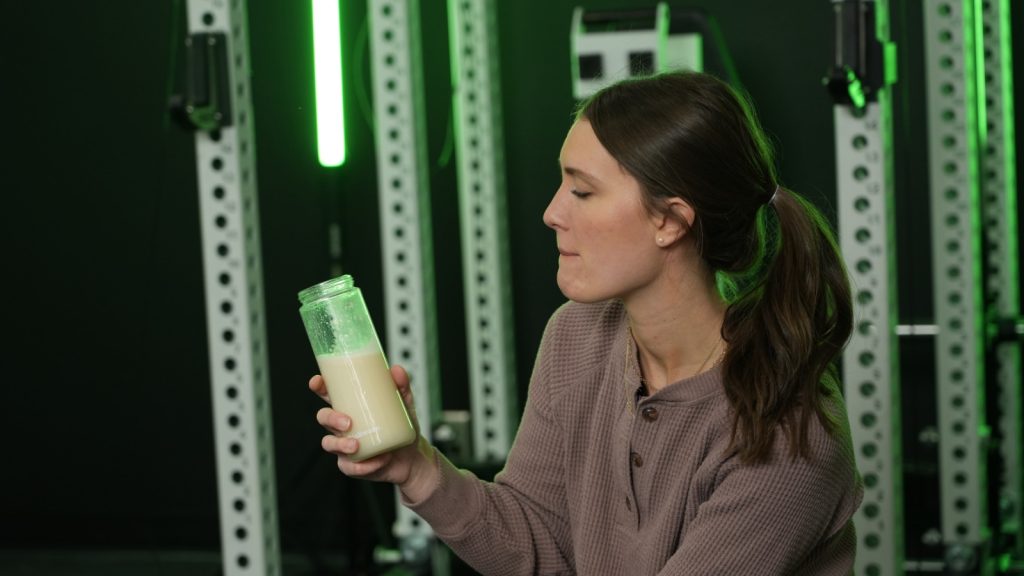
Some athletes consume more, even exceeding one gram per pound of body weight, and while it doesn’t appear that this has a negative effect, it’s not necessary to eat this much. There’s some evidence that for advanced bodybuilders with significant muscle mass who are also trying to lose fat — that is, maintaining a big calorie deficit — a higher intake of two to three grams per kilogram of body weight (one to 1.3 grams per pound) might be useful for retaining muscle. (11)(12) This isn’t necessary for the average person who works out a few times a week.
When Should I Consume Protein Shakes?
Most people who use protein shakes are trying to find a way to increase their daily protein intake. When the old chicken and rice routine starts to weigh on you, it’s a lot easier to slam down a shake that takes no cooking.
Contrary to the old adage of the anabolic window, timing your protein intake relative to your workout is not as important as keeping track of your daily intake. If muscle protein synthesis is your major concern, then spacing out feedings every three to five hours allows for the greatest muscle protein synthesis to occur. (5)
What to Consider Before Buying Protein Shakes
If you couldn’t tell, there are a ton of protein shakes out there. Here are some helpful pointers for you to keep in mind before making a purchase.
Protein Content
This is obviously the top priority if you’re reading a list of best protein shakes. Most products sit at around 20 grams per serving but all of our picks exceed that level. As an added bonus, it can be helpful to see if a product contains an amino acid profile on the label to ensure you’re getting an effective dose of each amino acid. One of the most well-researched amino acids is leucine, which has demonstrated the highest contribution to muscle protein synthesis. So be sure to check the label to see how much you’re getting per serving. (2)
Training Goals
While most probably think about muscle building when it comes to protein shakes, they can serve a variety of purposes depending on what you’re trying to accomplish in the gym. For example, bodybuilders often prioritize a higher consumption of carbs and fats relative to protein when in the off-season as a bulking strategy. As a result, a protein shake with other macronutrients included may be more appropriate as a means to reach their overall dietary goals during their prep.
On the flip side, an endurance runner trying to cut weight for a competition may want to increase their protein intake to sustain muscle mass and wean down other macros to promote weight loss. This person would probably benefit from a whey isolate, or some other low-calorie protein shake with very high protein content and lower fat and carb content. As you can see, your choice will be best suited for why you want to increase your total protein intake in the first place.
Intolerances
The majority of protein shakes on the market are derived from whey, which is not well tolerated by every person, as most whey products still contain a small amount of dairy. For this reason, many products, including some that we have listed here, incorporate digestive enzymes or contain no dairy at all. Just make sure to keep an eye on the label before you check out.
Final Word
At the end of the day, there is nothing magical about protein shakes. For most people, they can be an effective way to boost daily protein intake and make the best of time spent in the gym. The choices on this list are a good swath of what’s available on the market today, and you can be sure to find a product that delivers the nutrition, high quality, taste, and value that you are looking for.
While some customers may be looking for a low-calorie, high-protein shake, others may want a full meal replacement shake with a higher carb/fat count and a variety of micronutrients. So whether you are a meathead through and through, or are just getting started on your health and fitness journey, you should be able to find a protein shake here to satisfy your needs. Set your budget, note your desired ingredients and dosages, and allow this list to be your guide through the rest.
Frequently Asked Questions
What is the difference between a whey concentrate protein shake and a whey isolate protein shake?
Whey isolate undergoes more filtering during production and thus typically yields a higher protein content per serving, and a lower concentration of other macros, such as carbs and fats. Whey concentrate is not as filtered during processing, so the total calorie count is higher and the macro split includes greater amounts of carbs and fats. This is why whey isolate is usually more expensive.
Is the protein content in a protein shake different from what I would eat in a meal?
A protein shake is just an easier way to increase protein intake. For many protein shakes, the calorie content is significantly reduced compared to most meals to prioritize protein consumption. Concentrated sources of protein such as whey are unique in that they supply a broad spectrum of essential amino acids compared to the volume consumed. Many people find it easier to increase protein intake by supplementing with a protein shake rather than adding an extra meal.
Do I need to use a protein shake to gain muscle?
No, this is totally up to each individual. They are a useful tool that can make increasing protein intake easier in one’s diet, but there is no secret sauce when it comes to protein shakes. While there are some quality considerations when it comes to different products (such as whey or pea protein sourcing), they are just derivatives of substances found in food.
How many protein shakes a day?
There isn’t necessarily a limit to how many shakes you can drink per day. But drinking that much protein can be difficult for your digestive system if you’re sensitive to dairy. But if you really need to increase your intake, start with one daily and then up the amount slowly to test your tolerance.
Are protein shakes good for you?
Protein shakes are an easy way to get a lot of protein without needing to cook or eat solid foods. Many of these formulas are also fortified with micronutrients, which can increase the overall nutritional benefit of your shake, too.
Are protein shakes good for weight loss?
A calorie deficit is the only way you can effectively lose weight. With that said, there are plenty of low-calorie protein shakes you can use when following a calorie deficit diet. If shedding a few pounds is on your list of goals, look for a shake that’s high in protein but lower in fats and carbs.
References
- Dietary Guidelines for Americans 2015-2020. (2016, December). Cut down on saturated fats – health. Health.gov. Retrieved April 4, 2022, from https://health.gov/sites/default/files/2019-10/DGA_Cut-Down-On-Saturated-Fats.pdf
- Gorissen SHM, Crombag JJR, Senden JMG, et al. Protein content and amino acid composition of commercially available plant-based protein isolates. Amino Acids. 2018;50(12):1685–1695. doi:10.1007/s00726-018-2640-5
- Groen BB, Horstman AM, Hamer HM, de Haan M, van Kranenburg J, Bierau J, Poeze M, Wodzig WK, Rasmussen BB, van Loon LJ. Post-prandial protein handling: you are what you just ate. PLoS One. 2015;10(11):e0141582. doi: 10.1371/journal.pone.0141582.
- Hussain, N., Li, R., Takala, T. M., Tariq, M., Zaidi, A. H., & Saris, P. E. (2021). Generation of Lactose- and Protease-Positive Probiotic Lacticaseibacillus rhamnosus GG by Conjugation with Lactococcus lactis NCDO 712. Applied and Environmental Microbiology, 87(6). https://doi.org/10.1128/aem.02957-20
- Mitchell, W. K., Phillips, B. E., Hill, I., Greenhaff, P., Lund, J. N., Williams, J. P., … & Atherton, P. J. (2017). Human skeletal muscle is refractory to the anabolic effects of leucine during the postprandial muscle-full period in older men. Clinical science, 131(21), 2643-2653.
- Prietl, B., Treiber, G., Pieber, T., & Amrein, K. (2013). Vitamin D and Immune Function. Nutrients, 5(7), 2502–2521. https://doi.org/10.3390/nu5072502
- Sacks, F. M., Lichtenstein, A. H., Wu, J. H., Appel, L. J., Creager, M. A., Kris-Etherton, P. M., … & Van Horn, L. V. (2017). Dietary fats and cardiovascular disease: a presidential advisory from the American Heart Association. Circulation, 136(3), e1-e23.
- Schümann, K., Ettle, T., Szegner, B., Elsenhans, B., & Solomons, N. W. (2007). On risks and benefits of iron supplementation recommendations for Iron Intake Revisited. Journal of Trace Elements in Medicine and Biology, 21(3), 147–168. https://doi.org/10.1016/j.jtemb.2007.06.002
- Wang J, Ji H. Influence of Probiotics on Dietary Protein Digestion and Utilization in the Gastrointestinal Tract. Curr Protein Pept Sci. 2019;20(2):125-131. doi: 10.2174/1389203719666180517100339.
- Rodriguez NR, et al. Position of the American Dietetic Association, Dietitians of Canada, and the American College of Sports Medicine: Nutrition and athletic performance. J Am Diet Assoc. 2009 Mar;109(3):509-27.
- Helms ER, et al. Evidence-based recommendations for natural bodybuilding contest preparation: nutrition and supplementation. J Int Soc Sports Nutr. 2014 May 12;11:20.
- Breen L, et al. Leucine: a nutrient ‘trigger’ for muscle anabolism, but what more? J Physiol. 2012 May 1;590(9):2065-6.
